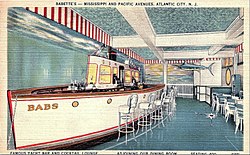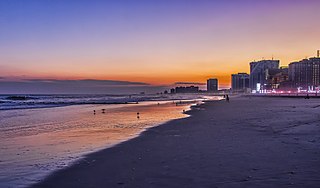
Atlantic City, sometimes referred to by its initials A.C., is a Jersey Shore seaside resort city in Atlantic County, in the U.S. state of New Jersey. Located in South Jersey on Absecon Island, the city is prominently known as the "Las Vegas of the East Coast." Known for its taxis, casinos, nightlife, boardwalk, and Atlantic Ocean beaches and coastline, Atlantic City inspired the U.S. version of the board game Monopoly, which uses various Atlantic City street names and destinations in the game. New Jersey voters legalized casino gambling in Atlantic City in 1976, and the first casino opened two years later. From 1921 to 2004, Atlantic City hosted the Miss America pageant, which later returned to the city from 2013 to 2018.

Enoch Lewis "Nucky" Johnson was an Atlantic City, New Jersey political boss, a sheriff of Atlantic County, New Jersey, a businessman and a crime boss who was the leader of the political machine that controlled Atlantic City and the Atlantic County government from the 1910s until his conviction and imprisonment in 1941. His rule encompassed the Roaring Twenties when Atlantic City was at the height of its popularity as a refuge from Prohibition. In addition to bootlegging, the criminal aspect of his organization was also involved in gambling and prostitution. The hit HBO series Boardwalk Empire was based on Johnson, portrayed by Steve Buscemi as Nucky Thompson.

Francis Sherman "Hap" Farley was a New Jersey State Senator from Atlantic County, New Jersey, described by The New York Times in 1977 as "probably the most powerful legislator in New Jersey history". He served for what was then a record 34 years in the New Jersey Legislature and was throughout that period the political leader of the Republican political machine that controlled the Atlantic City, New Jersey, and Atlantic County governments.
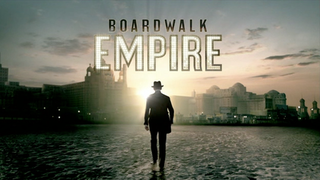
Boardwalk Empire is an American period crime drama television series created by Terence Winter and broadcast on the premium cable channel HBO. The series is set chiefly in Atlantic City, New Jersey, during the Prohibition era of the 1920s and stars Steve Buscemi as Nucky Thompson. Winter, a Primetime Emmy Award-winning screenwriter and producer, created the show, inspired by Nelson Johnson's 2002 non-fiction book Boardwalk Empire: The Birth, High Times, and Corruption of Atlantic City, about the historical criminal kingpin Enoch L. Johnson.
"Boardwalk Empire" is the pilot episode of the HBO crime drama of the same name. Written by series creator Terence Winter and directed by Martin Scorsese with a budget of $18 million, the episode introduces the character of Nucky Thompson, played by Steve Buscemi, as the corrupt treasurer of Atlantic City who is involved in gambling and bootlegging in 1920. The show used a large ensemble cast and a specially constructed boardwalk set to re-create the Prohibition and Jazz Era, and was based on Boardwalk Empire: The Birth, High Times, and Corruption of Atlantic City by Nelson Johnson. Filming for the pilot took place at various locations in and around New York City in June 2009. The episode first aired in the United States on September 19, 2010.

Enoch Malachi "Nucky" Thompson is a fictional character and the protagonist of the HBO TV series Boardwalk Empire, portrayed by Steve Buscemi. Nucky is loosely based on former Atlantic City, New Jersey political figure Enoch Lewis "Nucky" Johnson.

"Hold Me in Paradise" is the eighth episode of the first season of the HBO television series Boardwalk Empire, which premiered on November 7, 2010. It was written by staff writer Meg Jackson and directed by Brian Kirk. Nucky attends the Republican National Convention in Chicago, while Eli fills in for him in Atlantic City.

The Ritz-Carlton Atlantic City, located at 199 S. Iowa Avenue in Atlantic City, New Jersey, began as a hotel on the Boardwalk in Atlantic City, built at the beginning of the Roaring Twenties and renowned for its luxurious decor and famous guests. It was used as an apartment hotel beginning in 1969, and then purchased in 1978 with the intention of developing it as a hotel and casino. The building was converted to The Ritz Condominiums in 1982.
"To the Lost" is the twelfth episode of the second season of HBO television series Boardwalk Empire and the season finale, which premiered on HBO December 11, 2011. The episode was written by series creator Terence Winter and directed by Tim Van Patten, both executive producers.
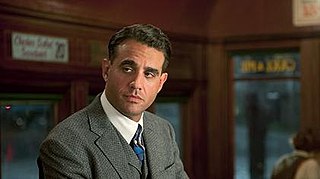
Giuseppe Colombano "Gyp" Rosetti is a character in the HBO TV series Boardwalk Empire, portrayed by Bobby Cannavale. Rosetti is a New York City gangster who works for Joe Masseria. Hot-headed, easily offended and prone to bouts of extreme violence, he is the primary antagonist of the series’ third season.

Nelson C. Johnson is an American author and former judge, lawyer and historian, best known for his 2002 New York Times bestseller, Boardwalk Empire: The Birth, High Times, and Corruption of Atlantic City. His book served as the basis for the popular and Emmy Award-winning HBO period political crime drama TV series Boardwalk Empire.

The Knife and Fork Inn is a restaurant located at the confluence of Atlantic and Pacific Avenues in Atlantic City, New Jersey which was first opened in 1912 as a private club by "the Commodore" Louis Kuehnle and then in 1927 "on the eve of Prohibition" became an exclusive dining room catering to the municipalities' upper echelons founded by the New York City hotelier Milton Latz.
James Howlett Boyd was an Atlantic City politician and criminal, who served under corrupt Atlantic County treasurer Enoch “Nucky” Johnson and New Jersey Senator Frank S. Farley.
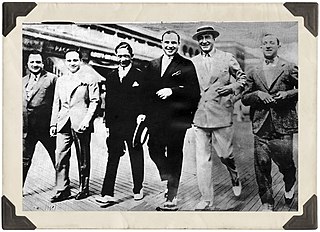
Nucky Johnson's Organization was a corrupt political machine based in Atlantic City, New Jersey that held power during the Prohibition era. Its boss, Enoch "Nucky" Johnson, coordinated the Organizations's bootlegging, gambling, racketeering, and prostitution activities.

The 500 Club, popularly known as The Five, was a nightclub and supper club at 6 Missouri Avenue in Atlantic City, New Jersey, United States. It was owned by racketeer Paul "Skinny" D'Amato, and operated from the 1930s until the building burned down in 1973.

Club Harlem was a nightclub at 32 Kentucky Avenue in Atlantic City, New Jersey. Founded in 1935 by Leroy "Pop" Williams, it was the city's premier club for black jazz performers. Like its Harlem counterpart, the Cotton Club, many of Club Harlem's guests were white, wealthy and eager to experience a night of African-American entertainment.
The Paradise Club or Club Paradise was a nightclub and jazz club at 220 North Illinois Avenue in Atlantic City, New Jersey. It was one of two major black jazz clubs in Atlantic City during its heyday from the 1920s through 1950s, the other being Club Harlem. Entertaining a predominantly white clientele, it was known for its raucous floor shows featuring gyrating black dancers accompanied by high-energy jazz bands led by the likes of Count Basie, Jimmie Lunceford, and Lucky Millinder. In 1954 the Paradise Club merged with Club Harlem under joint ownership.

Grace's Little Belmont was a jazz music bar and lounge in Atlantic City, New Jersey. Located at 37 Kentucky Avenue, it was one of the four popular black nightclubs situated on that street between the mid-1930s and mid-1970s; the others were Club Harlem, the Paradise Club, and the Wonder Gardens. The Little Belmont was located across the street from Club Harlem, with which it often shared performers and patrons. Wild Bill Davis and his swing and jazz quartet were featured summer performers from 1950 through the mid-1960s, and Elvera M. "Baby" Sanchez, mother of Sammy Davis, Jr., worked at the bar. The club closed in the mid-1970s and was later demolished.
Elias "Eli" Thompson is a fictional character in the HBO TV show Boardwalk Empire where he was portrayed by Shea Whigham and Ryan Dinning and Oakes Fegley in flashbacks in Season 5.
